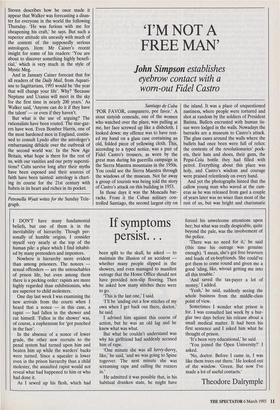If symptoms
persist. . .
I DON'T have many fundamental beliefs, but one of them is in the inevitability of hierarchy. Though per- sonally of humble origins, I consider myself very nearly at the top of the human pile: a place which I find inhabit- ed by many pretenders and impostors.
Nowhere is hierarchy more evident than among prisoners. The nonces — sexual offenders — are the untouchables of prison life, but even among them there is a pecking order: rapists are more highly regarded than exhibitionists, who are superior to child molesters.
One day last week I was examining the new arrivals from the courts when I heard that a nonce — in this case, a rapist — had fallen in the shower and cut himself. 'Fallen in the shower' was, of course, a euphemism for 'got punched in the face'.
In the absence of a nonce of lower grade, the other new recruits to the penal system had turned upon him and beaten him up while the warders' backs were turned. Since a squealer is lower even in the prison hierarchy than a child molester, the assaulted rapist would not reveal what had happened to him or who had done it.
As I sewed up his flesh, which had been split to the skull, he asked — to maintain the illusion of an accident — whether many people slipped in the showers, and even managed to manifest outrage that the Home Office should not have provided non-slip flooring. Then he asked how many stitches there were to go.
'This is the last one,' I said.
'I'll be 'anding out a few stitches of my own when I get back out there, doctor,' he said.
I advised him against this course of action, but he was an old lag and he knew what was what.
But what he couldn't understand was why his girlfriend had suddenly accused him of rape.
'One minute she was all luvvy-duvvy, like,' he said, 'and we was going to Spine togewer. The next minute she was screaming rape and calling the rozzers in.'
He admitted it was possible that, in his habitual drunken state, he might have forced his unwelcome attentions upon her; but what was really despicable, quite beyond the pale, was the involvement of the police.
'There was no need for it,' he said (this time his outrage was genuine enough). 'I mean, she's got free bruwers and loads of ex-boyfriends. She could've got them to come round and given me a good 'iding, like, wivout getting me into all this trouble.'
'And saved the tax-payer a lot of money,' I added.
'Yeah,' he said, suddenly seeing the whole business from the middle-class point of view.
Sometimes I wonder what prison is for. I was consulted last week by a bur- glar two days before his release about a small medical matter. It had been his first sentence and I asked him what he thought of prison.
'It's been very educational,' he said. 'You joined the Open University?' I asked.
'No, doctor. Before I came in, I was like them trees out there.' He looked out of the window. 'Green. But now I've made a lot of useful contacts.'
Theodore Dalrymple


















































 Previous page
Previous page